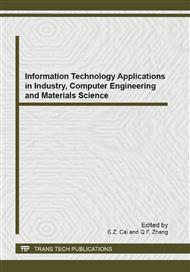[1]
Rich E. User modeling via stereotypes. Cognitive Science, 1979, 3(4): 329-354.
Google Scholar
[2]
Goldberg D, Nichols D, Oki BM, Terry D. Using collaborative filtering to weave an information tapestry. Communications of the ACE, 1992, 35(12): 61-70.
DOI: 10.1145/138859.138867
Google Scholar
[3]
Konstan JA, Miller BN, Maltz D, Herlocker JL, Gordon LR, Riedl J. GroupLens: Applying collaborative filtering to usenet news. Communications of the ACM, 1997, 40(3): 77-87.
DOI: 10.1145/245108.245126
Google Scholar
[4]
Shardanand U, Maes P. Social information filtering: Algorithms for automating"Word of Mouth". In: Proc. Of the Conf. on Human Factors in Computing Systems. New York: ACM Press, 1995. 210-217.
DOI: 10.1145/223904.223931
Google Scholar
[5]
Goldberg K, Roeder T, Gupta D, Perkins C. Eigentaste: A constant time collaborative filtering algorithm. Information Retrieval, 2001, 4(2): 133-151.
Google Scholar
[6]
Breese J S, Heckerman D, Kadie C. Empirical Analysis of Predictive Algorithms for Collaborative Filtering [C] / / Process of the 14th Conference on Uncertainty in Artificial Intelligence, 1998: 43-52.
Google Scholar
[7]
Resnick P, Iakovou N, Sushak M , et al. GroupLens: An open Architecture for Collaborative Filtering of Netnews[C]/ Process of the 1994 Computer Supported Cooperative Work Conference, 1994: 175-186.
DOI: 10.1145/192844.192905
Google Scholar
[8]
Sarwar B, Karypis G, Konstan J. Item-based Collaborative Filtering Recommendation Algorithms[ C] / / Process of the 10th International Conference on World Wide Web, 2001: 285-295.
DOI: 10.1145/371920.372071
Google Scholar
[9]
Chen Y H, George E I. A Bayesian Model for Collaborative Filtering [C] / / Process of the 7th International Workshop on Artificial Intelligence and Statistics, (1999).
Google Scholar
[10]
Billsus D, Pazzani M. Learning Collaborative Information Filters[C] / / Process of International Conferenceon Machine Learning, 1998: 46-54.
Google Scholar
[11]
Kim B M, Li Q, Park C S, et al . A new approach for combining content-based and collaborative filters[J]. Journal of Intelligent Inf ormation Systems, 2006, 27(1) : 79-91.
DOI: 10.1007/s10844-006-8771-2
Google Scholar
[12]
Vozalis M G, Margaritis K G. Applying SVD on item-based filtering [C] . In: Proceedings of 5th International Conference on Intelligent Systems Design and Applications (ISDA'05) 2005, 464- 469.
DOI: 10.1109/isda.2005.25
Google Scholar
[13]
Zhang Hai-yan, Ding Feng, Jiang Li-hong. A collaborative filtering recommendation method based on fuzzy clustering[ J] . Computer Simulation, 2005, 22( 8) : 144- 147.
Google Scholar
[14]
B M Sarwar, G Karypis, J Konstan, et al. Item-Based Collaborative Filtering Recommendation Algorithms, Process of the 10th Internet Conference on World Wide Web[C]: New York: ACMpress, 2001: 285-295.
DOI: 10.1145/371920.372071
Google Scholar


